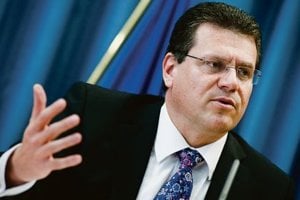The legislative energy package proposed by the European Commission Vice-president for Energy Union Maroš Šefčovič, does not primarily tackle the problem of high electricity prices in Slovakia, said Jozef Badida, analyst of the energieprevas.sk website dedicated to energy issues, during TABLET.TV’s discussion show on December 8.
“The high prices for electricity in Slovakia have historically been calculated to include financial support for renewable energy resources and its volume has been set; and currently we are bearing the brunt of that,” said Badida as cited by the TASR newswire. “It was a political decision. We let in many renewable resources and gave them a 15-year guarantee of the state-purchasing price.”
Badida believes that nowadays photovoltaic and wind power plants can be competitive. In addition, when they plan to produce a certain amount [of electricity] to be delivered to the electrical network, they can accomplish it. We're thus moving closer to the stability of these networks," stated Badida.
Šefčovič’s package is one of the most voluminous sets of legal measures in the area of power engineering the European Commission has ever drafted. Badida thinks that the measures concerning energy efficient buildings could garner the broadest support in the future.
 Šefčovič: Each EU state to prepare national integrated energy plan Read more
Šefčovič: Each EU state to prepare national integrated energy plan Read more The legislative proposals for the Clean Energy for All Europeans initiative involve energy efficiency, renewable energy resources, new concepts in the electricity market, security of electricity supplies and the rules of the Energy Union’s management. Part of the package counts on activities towards innovations in the area of clean energy and on the restoration of buildings across Europe.
The EU wants to play the leading role with respect to transitioning to clean energy. The union has committed to cutting its CO2 emissions by at least 40 percent by 2030 and to modernise its economy via the creation of new jobs.
The mobilisation of public and private investments could generate €177 billion every year as of 2021, a 1-percent growth in the EU’s GDP in the next decade and 900,000 new jobs.






